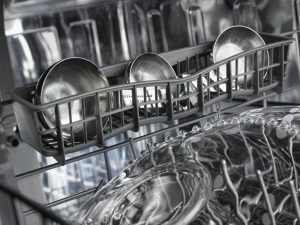1. Clean the Gunk
You can’t expect to get clean dishes if your dishwasher is dirty. Unfortunately, food residue can build up into gunk inside the dishwasher drum, which will need to be periodically cleaned. You can also reduce the amount of gunk inside your dishwasher by scraping the leftover food off your dishes before loading them. However, with most modern dishwashers, you will not need to pre-rinse your dishes.
2. Create a Balanced Load
One of the most common causes for a dishwasher not cleaning efficiently is improper loading. When the dishwasher is overloaded or crowded, the spray arms can be blocked, which prevents water from reaching all of the surfaces.
Keep heavier soiled items in the bottom tray and more delicate items in the top tray. Only put one item per slot and ensure that the cutlery rack is not jammed with items.
3. Use Good Quality Detergent
You should aim to use a high quality dishwasher detergent and rinse aid to get the cleanest clean. Never use hand washing dish soap in your dishwasher, as it creates too many suds and could even damage your machine. You should also pour detergent into the measuring cup built into your dishwasher to use the appropriate amount every cycle.
4. Choose the Right Program
Although it may be tempting to stick to the same dishwasher program over and over, most models have various programs to suit different loads and cycles. At the very least, your dishwasher is likely to have a regular cycle for normal loads, a heavy duty, deep clean cycle and a light cycle for more delicate or lightly soiled items.
You may be in the habit of using the deep clean cycle for all loads, but this will use far more water than necessary for a normal load. Conversely, if you use a light load, you may need to run some items through the dishwasher more than once, also creating water waste. So, before you turn on the dishwasher, have a double check of the load requirements and pick the program best suited to them.
5. Address Hard Water Issues
If your home has hard water, you may have noticed a residue on plates and spotting on glassware. Unfortunately, this is just one symptom of hard water and the scale caused by hard water could be accumulating inside your dishwasher, forcing it to work harder and use more energy.
If you suspect that you have hard water, you can perform an inexpensive test using a kit available at most home centers. You should then address the underlying hard water issue by installing a softener or other water treatment system.
6. Clear the Drain
Finally, this is an unpleasant task, but clogs can develop in the dishwasher drain and spray arm. Periodically check the drain and the holes in the spray arm to ensure that they are not clogged with hard water minerals, food residue or other blockages.
You can use a toothpick to dislodge particles in the spray arm holes, but to clear the drain, you will need to follow the instructions in your owner’s manual. This usually involves unscrewing the drain in the bottom of the dishwasher tub and clearing the screen under the kitchen tap.
If your dishwasher is not cleaning to your satisfaction, you can rely on a home appliance repair technician to assess your appliance, diagnose any underlying issues and provide an effective repair solution.
